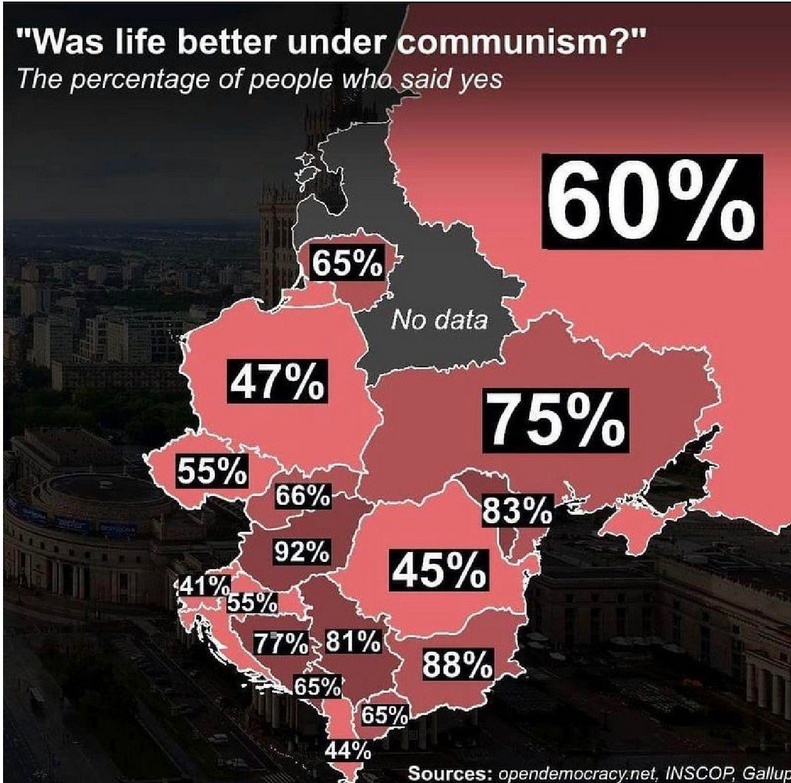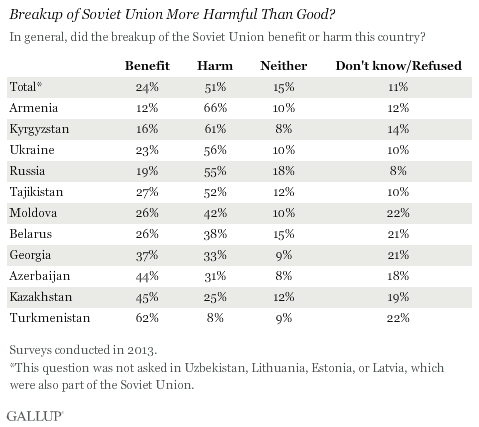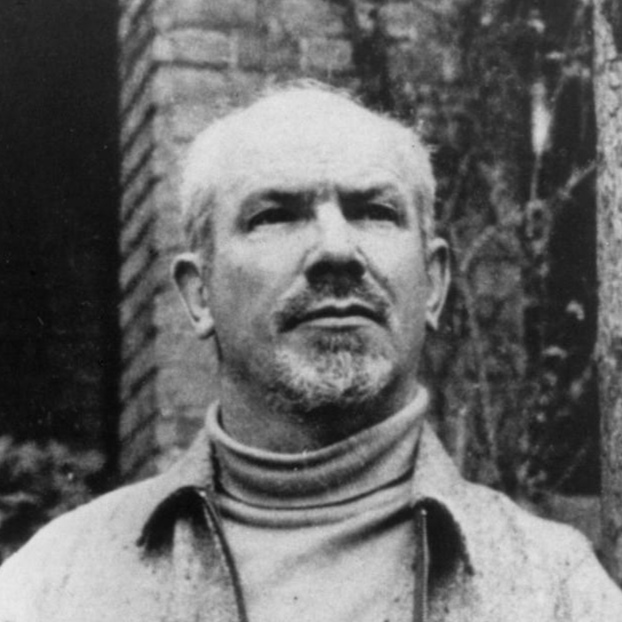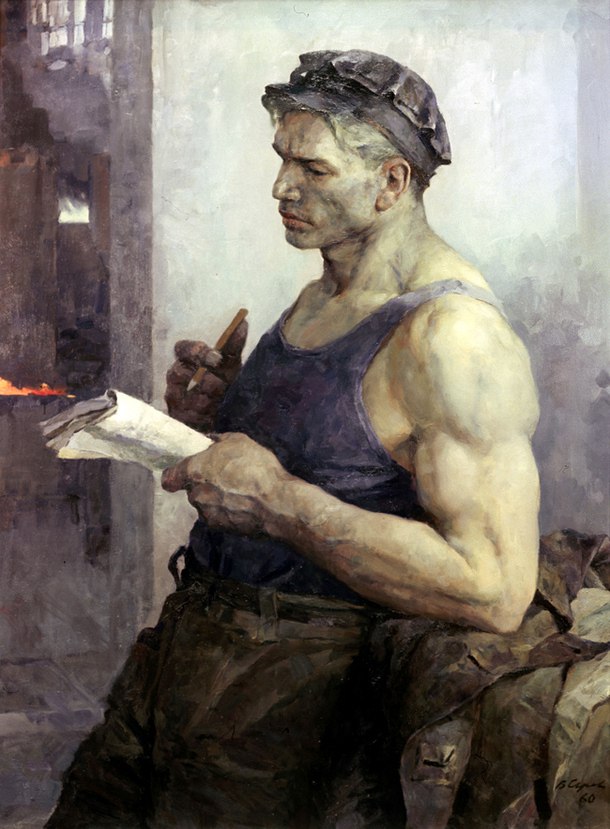I am quite certain that there are proportionally more communists in post-socialist countries than in Western countries. According to the results of the “Rendszerváltás 30” public opinion survey conducted in 2020 by Policy Solutions, Závecz Research, and the Friedrich-Ebert-Stiftung, 52% of the Hungarian population believes that the relative standard of living was better during the Kádár era, while 31% think it was worse. (Page 24) Of course, this doesn’t mean that 52% of the respondents are communists, but the results significantly contradict this meme. Is there any source to support the claim that there is a higher proportion of communists in Western countries compared to post-socialist countries?
I cannot speak for other countries, but here, the Kádár-era remains popular for many people even to this day, particularly among those who lived during that time.shit meme
Ask Czechs, Slovaks, Poles, Hungarians, everyone in former Yogoslavia and Baltics…
A yes Yugoptnik the perfect example lf how happy and content eastern europeanz are
I have read your sentence 4 times and I got no clue what are you trying to say here. Are you really trying to say that Yugoslavia was more stable under communism than it’s individual states today?
A ten year old poll, that happened before some important recent events, and is mostly from Russian client states in central Asia and the Caucasus because it only encompasses countries that were part of the Soviet Union is disingenuous, at best, in response to this post about eastern Europe.
Try that poll again today in Albania, Bulgaria, Czech Republic, Slovakia, former East Germany, Hungary, Poland, Romania, and the Balkans. See how that goes.
Edit: I don’t know how I overlooked the Baltics, I was just in Lithuania, Latvia, and Estonia for a few weeks this spring. If the museums are anything to go by, their responses to this question would definitely contradict your narrative and they were part of the USSR.
a yes nazi collaborators
The standard of living cratered in many of the former soviet countries. It turns out, while communism as implemented by the USSR had it’s downsides, in general, the populace as a whole were better off.
Every time I see something like OP’s post, I’m reminded that oil companies can’t stop destroying the earth because stonks must go up. But yeah, communism is the boogie man.
The question was not asked in the Baltic states or Uzbekistan. The question was also not asked in Soviet puppet states like Poland, Czechia, Slovakia, etc.
Most of those are also authoritarian. Tossing out one dictator for another is not going to leave people very satisfied.
The least racist westerner has logged on. Fuck what majority of people who lived in USSR think, it’s the people with blond hair and blue eyes whose opinions really matter.
Are you that fucking stupid? There are a ton of Russians, Belorusyans, and Ukrainians who are blond haired and blue eyed. They also did not include 36 million people in Uzbekistan which has very few blond haired blue eyed people. You know who also is not blond haired and blue eyed? Azerbaijan, Georgia, Kazakhstan, and Turkmenistan who see it as a benefit that the shitty Soviet Union broke up. But I guess you do not give a shit about them. That seems pretty racist of you.
It’s not racist to recognize that ignoring the over 100 million people that live in states that were either Soviet or Soviet puppet states kind of fucking skews the results.
Your argument makes no sense. Go back to summer school, child.
Meanwhile in the real world
-
-
-
-
-
-
Former Soviet Countries See More Harm From Breakup https://news.gallup.com/poll/166538/former-soviet-countries-harm-breakup.aspx
Oh and finally, this study shows that unprecedented mortality crisis struck Eastern Europe during the 1990s, causing around 7 million excess deaths. The first quantitative analysis of the association between deindustrialization and mortality in Eastern Europe.
So, take a sit there little buddy.
Nice copy pasta.
That Pew Research poll is 13 years old during a global financial crisis. A much more recent one (2019) shows that 7 in 10 Hungarians approve of the shift to a market economy.
That same poll showed that over 90% of Germans are happy with reunification. The article from Der Spiegel is 14 years old during a global financial crisis. I lived in Berlin around that time. There was a little bit of Ostalgie but honestly a lot of them were little more than neo Nazis and ended up supporting the AfD. If those are the communists you want to hang out with, be my guest.
Not sure why you devote so much space to the blond hair blue eyed Russians. Seems pretty racist.
Yugoslavia was not a Soviet puppet state nor Eastern Europe so not sure why you are bringing it up. There was also a lot more to Yugoslavia than Serbia.
Things haven’t gotten better in these countries in the past 13 years, and current pro western governments are looking pretty shaky as a result. Seethe and cope there child.
Citizens of those countries disagree with you. Seethe and cope, child.
-
Comments like this radicalize the right and alienate people on the left, you achive absolutely nothing, just culture war fuel for the right, people from the Warsaw pact are not subumans, you don’t even understand that you support a race biased perspective with a mentality like this
Nah, pointing out racist shit scumbags say here is not radicalizing the right or alienating anybody who is actually on the left. The fact that westerners focus on the opinions of predominantly white people in eastern europe over those in the rest of USSR is racist as fuck.
As I said Warsaw pact people are not subhuman, judging from your comments they are, and even if you want to go into pseudo science race theory, the poles are white slav like the majority, russian and the ukranians, Georgia is another state that is in the poll, yet is a white majority, so why did they left some of the biggest and most populous part of the USSR? You are the perfect example of extreme race ideas, just not the white mainstream ones, race is a social construct, used to divide the people to let them fight against each others, you fit the role perfectly, if you were communist you would say that racial war is a distraction to class war, or am I wrong?
You’re just making a straw man there because nobody said anything about Warsaw pact people being subhuman except you. What was actually said was that the opinions of white people in European parts of USSR are prioritized over those who lived in the rest of USSR in the west. Nobody is talking about any race war here except you. You keep trying to call me a racist for pointing this out shows the depths of your intellectual dishonesty. I’ve got nothing else to say to you.
How dare teenagers not become Neoliberals while growing up in a late capitalist hellscape where climate change can’t be taken seriously because it isn’t a profitable problem to solve.
There’s a lot a reasonability in the space between neoliberalism and “Stalin did nothing wrong”
There’s a lot of space in the left that isn’t stalinism. You can be a communist and have a deep critique of how 20th century communism worked, a learning from it and not wanting to repeat the bad parts.
In leftist circles in the US, weird Stalin and Lenin fans are loud, but ultimately not that common.
Removed by mod
Meanwhile in the real world
Just speaking to the first one as I have some experience regarding that, the reason people feel Hungary has been a better place to live under communism might be because of any of the following:
- First and foremost, Hungary was living beyond its means after 1970. The ruling communist elite (this term should be an oxymoron, but somehow it seems it isn’t) fearing an upheaval because of the global economic downturn, started to take out loans to keep the country placated. Hungary was never able to repay this, and indeed its liabilities only grew under the communist regime.
- The current set of idiots changing one another actually have to have the country repay all that money. So yeah, Hungarians feel that living in a mansion bought on a loan so to speak was much better than having to pay for it and getting evicted.
- Speaking of the current idiotic leadership, Hungary never really ousted the communist regime, so they transitioned into the new elite. Most current Hungarian politicians were well positioned in the previous system, or were outright party members.
- Regarding the current leadership and why people feel that the EU is bad for them, Hungary spends more money on anti-EU propaganda than its whole education system and has done so for more than the past decade.
In no other Central or Eastern European country surveyed did so many believe that economic life is worse now than during the communist era.
No other Central or Eastern European country is so blatantly serving the interests of Russia and China over its own and (that of its aliies’) either. Maybe that’s not a coincidence.
Just 46% of Hungarians approve of their country’s switch from a state-controlled economy to a market economy
Calling Hungary’s economy a “market economy” would imply that the majority of Hungary’s capital assets is not captured by government aligned interests.
I don’t personally have experience with the rest, but what you’ve written implies Hungary would be better under communism. The truth is, Hungary has a huge voter bloc that wants to go back to communism, and they elect fascists that promise to do it. The result is obvious.
Oh, the transition to communism wasn’t simple either, Hungary set the still-unbroken world record for hyperinflation in the fist years of communism, when they managed to inflate their whole money supply to a collective value of 0.3 US cent. So those guys were obviously saying “we were better under the monarchists!”. And they were in clear majority, before communist elites in Hungary called in Soviet troops to reestablish the repression.
It’s truly bizarre to me how when eastern Europeans like us talk about our countries, our opinions don’t matter because some poll contradicts us. You know far better than I do what was and is going on in Hungary, but talking about Romania like the streets were paved in gold during the communist period is utterly bizarre when many families spent their life savings on getting smuggled out of the country via Serbia, Roma were the target of an attempted genocide via forced adoption, many Hungarian minority towns were intentionally disadvantaged, and Jews, while initially huge supporters of the Romanian communist movement (for obvious reasons), were later systematically purged from any position of power and the government eventually came up with a deal with Israel to get Israel to pay thousands of dollar per Jew allowed to leave.
None of these sound like the hallmarks of an equitable, safe and stable society.
I can’t speak to the rest of it, but about Romanians who “would have voted for Ceausescu”: they overwhelmingly tend to be village hicks or people directly hurt by the mad scramble during the post-soviet period where communist party officials sold themselves everything that wasn’t nailed down for nothing.
It’s also worth mentioning that PSD is overwhelmingly the old communist party under a new name, and they are despised by a large number of Romanians.
EDIT: Also, to address the “better off” part: yes, that is true. If you were white, male and ethnically Romanian. Minorities like the Hungarians and Roma had a really bad time. To be a “good communist woman” you were expected to be a baby factory to increase the population and denied birth control.
It is clear just exactly who ruled the party during communism when you look at PSD’s policy. Being in favour of a privatised energy sector is not very socialist at all. To me this just shows how little value they put on socialist values and paradigms back then too.
No socialist project can work long term when built with a small number of people at the top, determining everything. Power needs to be as spread out as possible.
-
No communism, but socialism yes.
And yes, I am from east Europe
Meanwhile, Eastern Europeans:

Poland? UA? WTF?! What are your sources, sir? This looks and very likely is bullshit. My grandparents would never vote for the communists.
I don’t have the sources for that specific graph but I do have this one showing 7 out of 11 former soviet countries saying it: https://news.gallup.com/poll/166538/former-soviet-countries-harm-breakup.aspx
…did you read this whole thing? Or just take the numbers and run with it?
Overall, residents who are more educated are less likely to say the collapse harmed their country and more likely to say it benefited them. Kyrgyzstan is the exception.
Residents who say that “most people” in their country are afraid to openly express their political views are more likely to say that the collapse harmed their country than those who say that “no one” is afraid. This suggests the freedom they thought they might have after the fall of the Soviet Union has not materialized – and in some cases, the situation may be even worse. Under the strict regime in Tajikistan, for example, 61% of those who say most people are afraid also say the breakup hurt their country, compared with 35% of those who say no one is afraid.
Also:
Overall, residents who see opportunities for their children and themselves to succeed are more likely to say the breakup benefited their country than those who do not. Thirty percent of residents of these former republics who say children in their country have the opportunity to learn and grow say their country benefited, compared with 18% who do not think children have this opportunity. And in all countries, residents who say people in their countries can get ahead through hard work are twice as likely to say their country benefited (29%) than those who do not think they can get ahead (17%)
How is any of this proof that these countries should return to communism? It sounds like education, freedom of political expression and those who see opportunity in themselves and their children are all factors in people turning their backs to communism.
residents in seven out of 11 countries that were part of the union are more likely to believe its collapse harmed their countries than benefited them
I just quoted literally verbatim what the pollers said. You can deep dive looking for cope all you want but the fact remains that people see the change to capitalism as making their countries worse. If you want to get more upset you can read my other longer comment.
I’m not upset. :)
I did go back and go through what you posted. At the end of the article about Hungary. There’s a “read more” link, which expands the article to include this:
However, these findings do not mean Hungarians are rejecting democratic values. In fact, as the survey illustrates, they are more likely than other former Eastern bloc publics to say it is very important to live in a country with democratic rights and institutions. But few believe Hungary currently has these democratic freedoms.
However, when reviewing these gloomy findings about the state of democracy in Hungary, it is worth remembering that they do not mean Hungarians are abandoning democratic values. To the contrary, Hungarians continue to want democratic rights and institutions — in fact, they place a higher premium on these things than their post-communist neighbors. When asked to rate the importance of six key features of democracy, Hungarians stand out for their strong embrace of democratic values.
The challenge for Hungary is that, while most Hungarians want democratic values and institutions, few think they have them. For instance, 70% think it is very important to live in a country with honest multiparty elections, but only 17% believe this describes Hungary very well. Taking the median percentage saying these values are very important in each country and comparing it with the median percentage saying these values describe their country very well gives us an overall “democracy gap” for each country. The gap is large throughout Eastern Europe, but is widest in Hungary — evidence that Hungarians, who once pioneered the transition away from communism, are not turning their backs on democracy. Instead, they are frustrated by the fact that democracy has yet to fully flourish in their country.
So they absolutely aren’t saying they want to return to communism. Like, at all. They’re just frustrated that joining the EU isn’t the democratic form of governance they were hopping for, and are dissatisfied with that.
Weird how the people that lived under communism correlate with greater support for communism isn’t it? (sarcasm)
Completely goes against the point being made by this meme.
…are you just ignoring what I just wrote above? Lol. They don’t correlate with greater support for communism. The numbers don’t mean they want to go back to communism, they mean they want more democracy.
I also like how there’s no data for like the most anti soviet regions. Searching for the source at the bottom only gave me the same picture in a ifunny post so I’m assuming this is bullshit.
The famously anti-soviet country of Belarus, unlike the extremely pro-soviet regimes of Poland, Ukraine and Lithuania.
I literally showed you several of the sources for this FIVE HOURS before you made this comment claiming they don’t exist and it’s bullshit. This is what I mean with you people. You just LIE.
The sources are quite literally listed and in some countries more than 50% said no. Sounds like your grandparents are some of the no’s represented in the data. I’m not sure what point you think you’re making?
If you read the actual articals, they’re not saying they want to return to communism, like at all. They’re saying they’re not satisfied with the EUs extent of democracy, and want to become more democratic.
A country goes far beyond one’s own surname.
Not just teenagers sadly.
communism is when ussr
There is no such thing as pure capitalism.
Making this meme took longer than opening a book to understand what communism actually is.
What everyone points to as “communism” shares more in common with capitalism than anything else. They had authoritarian rulers and a small wealthy class that lords over the rest of the populace.
There is nothing “worker owned” about these examples and it only serves to spread FUD about moving away from capitalism towards a more human centric economy
I got to open my eyes more, because I don’t see anyone praising communism. What I do see quite a lot is people praising the ultra rich that have made their fortune through exploitation of the poor and public subsidies.
Stop at socialism. You never go full daddy-state.
Corporatism is basically the same thing except we let private organisations who’s only interest in profit be “daddy”
Corporatism is capitalism. A free market will always consolidate, monopolize, and expand its power. It’s not going to let some government get in its way. That’s why they become the government like in the US today.
Socialism is actually full daddy-state.
Communism would be a stateless existence.
Tell me you know knowing about socialism or communism without telling me you’ve never opened a book
I really find all these posts entertaining, there are a bunch of reddit refugees that are trying to impose their ideology on Lemmy. It’s almost like they’re trying to ironically colonize the space.
dude im just glad here we can educate them
Or maybe your echo chamber is getting a taste of centrism.
imagine saying centrism unironically
Lol centrism is just Neoliberalism that’s pretending not to be right wing.
Oh good! I was hoping for some condescension!
I expected this shit here tbh













